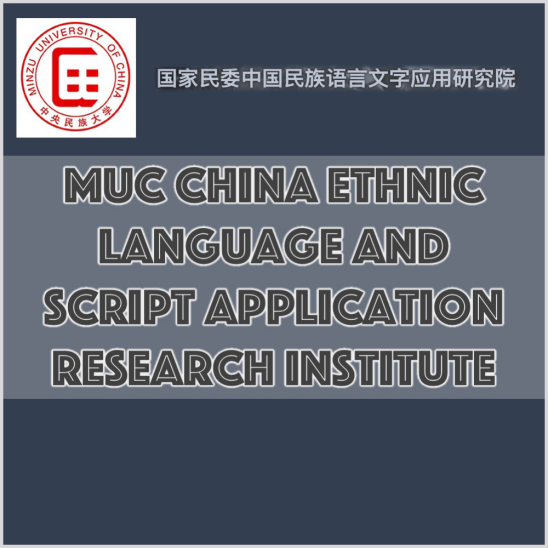School Overview & Development History
The MUC Institute for the Application of Chinese Ethnic Languages and Characters is a provincial and ministerial research platform approved by the State Ethnic Affairs Commission. It is an important research base for the ethnic minority nationality language and writing work of the State Ethnic Affairs Commission. It was officially established on December 29, 2017.

The mission of the Institute is to closely focus on the major needs of national unity and progress. The Institute also aims to contribute to the social development of ethnic regions and do work on core issues found in applying ethnic languages. These include developments encompassing national language conditions, language policies, language strategies, language security, and standardization of ethnic languages and research on standardization and informatization, and more. It also carries out research on establishing language ecology and harmonious language life in ethnic areas under the background of assisting border areas in prospering and enriching those people, targeted poverty alleviation, urbanization, and modernization. The Institute also does work related to carrying out ethnic minority mother-tongue teaching and promoting and popularizing the common national language in ethnic areas. Concerning theoretical and practical explorations, it works to summarize and explore the model, approach, and experience of bilingual education and teaching in China's ethnic minority areas. It is working to establish itself as a third-party evaluation platform for the application of ethnic languages in China. Moreover, it works to establish more scientific and diverse evaluation standards and conduct evaluative research. The Institute is fully committed to serving the country's national language construction efforts.

Majors & Programs
The Institute does not offer any major or training programs.
Undergraduate Programs (4-Year Programs)
• None
Professional Master's Programs (2-Year Programs)
• None
Academic Master's Programs (3-Year Programs)
• None
Doctoral Programs (4-6 Year Programs)
• None
Post-Doctoral Programs:
• None
Other Specialized Coursework (Program Durations Vary)
• None
School Focus, Beliefs & Development Objectives
The Institute will give full play to the advantages of MUC. It strives to organize various efforts across the country to consolidate the direction of research. The Institute focuses on the actual needs of the Chinese language and national conditions. It seeks to develop through innovation and cooperation while striving to make itself an important think tank for the application of national language research in China.

Ethnic Minority Nationality Language and Written Application Countermeasures Research Office
The Insistitute also has a Ethnic Minority Nationality Language and Written Application Countermeasures Research Office. The main responsibility of the office is to carry out countermeasure research on practical problems in the application of minority languages in the following aspects:
1. Carry out investigations and studies on language national conditions, language policies, language strategies, language security, and more. Provide a research basis for the state to formulate and adjust ethnic languages and related policies and regulations and advise the State Ethnic Affairs Commission Expert Advisory Committee on Ethnic Languages.
2. Explore issues related to the theory and practice of minority mother-tongue teaching and popularization of Mandarin as the common spoken and written language in minority areas. Summarize and explore the model, approach, and experience of bilingual education and teaching in China's minority areas and develop bilingual laws in minority areas. The research on bilingual professionals' training provides references for the country to formulate bilingual education policies and provides countermeasures and suggestions for education administration departments and teaching units.
3. Research the creation of language ecology and harmonious language life in ethnic regions. Conduct research on bilingual harmony in making border areas prosperous and enriching people while also executing precision poverty alleviation strategies in ethnic regions and urbanization. Other than this, the Institute works to summarize and promote experience surrounding nationwide bilingualism and harmonious community initiatives implemented by the State Ethnic Affairs Commission and the Ministry of Education Construction experience.
Standardization and Informationization Research Office
The Institute also operates the Standardization and Informationization Research Office. The main task of this office is to study the standardization and informatization of ethnic minority nationality languages.
1. Actively cooperate with relevant departments of various ethnic autonomous areas to standardize the research on the Chinese transliteration of the names of ethnic minorities, find and determine the corresponding laws of transliteration of the names of ethnic minorities and Chinese, and provide a scientific basis for the country's household registration and population management.
2. Cooperate with domestic and foreign intelligent speech and artificial intelligence technology institutions to apply cutting-edge technologies such as big data and artificial intelligence core technologies to the research of ethnic languages, including speech recognition, speech synthesis, handwriting recognition, machine translation, also to realize the national-Chinese Bilingual real-time simultaneous translation and real-time conversion of language and text. Develop a series of bilingual intelligent interactive products and services, promote the creation of a cloud service industry base for some ethnic languages and an R&D and production base for some ethnic languages and intelligence products, and apply R&D results to all ethnic groups in the regards of education, medical care, poverty alleviation, tourism, agriculture and animal husbandry in the region.
3. To create and form a third-party evaluation platform for the application of Chinese ethnic minority languages. We are aiming at the standardization, standardization, and informatization of minority languages and other development tasks deployed by the State Ethnic Affairs Commission. Moreover, work to establish scientific and diverse evaluation standards, develop more advanced and scientific evaluation tools, implement comprehensive and complete evaluation procedures, and carry out more in-depth evaluations.
General Affairs Office
The institute also has an General Affairs Office which handles the following aspects of work and more:
Administrative affairs management. Responsible for drafting the institute's annual work plan and annual work summary; keeping records of the institute affairs meetings and related meetings, and compiling and issuing briefing newsletters, etc.. It is responsible for the management of the institute's finances, various special funds, scientific research funds management, and annual financial funds and budgets. It is responsible for fixed asset management, equipment maintenance management, government procurement, and preparation services for various conferences. Moreover, it is responsible for archives management of the whole hospital, receiving and sending, circulating, filing, receiving and dispatching of various documents. It is also responsible for accepting relevant complaints and responding to legal affairs. Lastly, it is responsible for the operation and maintenance of the Institute's website.
The office is also responsible for ersonnel management. It is responsible for the drafting of various policies, rules and regulations related to the recruitment of talents of the Institute. Moreover, it is responsible for the management of the recruitment, appointment, salary and welfare of the staff of the Institute. In addition, it is responsible for the declaration of scientific research positions and scientific research allowances of professional and technical personnel according to needs.
Multilingual Society and Policy Research Office
The main responsibility of the Multilingual and Multilingual Society and Policy Research Office is to study the new characteristics and new problems that have emerged in the development of language applications in the new era. Especially how to handle the relationship between the languages of different ethnic groups in the new era, and how to deal with different ethnic languages and bilingualism in general. The informatization of minority languages and national language security is also one of the office's research tasks in addition to research related to the relationship between language and ethnic education, research and countermeasures pertaining to cross-border languages as well as recording/archiving and protection of language resources and so on.
Our Talent
As a non-independent research platform, the institute borrows from the experience and expertise of a wide range of scholars and experts conducting research and teaching in a variety of schools at MUC including the following individuals. The researchers of the Institute are divided into two types: full-time and part-time. In addition to full-time researchers, the institute employs part-time personnel based on research tasks and research plans. Part-time personnel participate in the research tasks of the institute in the form of specially-appointed professors and researchers. The employment period is determined by the time limit of project research.
Institute Academic Committee Members:
• Abducesti Yakupsin (阿布都热西提·亚库普新)
• Baiyinmende (白音门德)
• Dai Qingxia (戴庆厦)
• Ding Shiqing (丁石庆)
• Huang Xing (黄行)
• Sun Hongkai (孙宏开)
• Li JinFang (李锦芳)
• Lityptohuti (力提普托合提)
• Li Xulian (李旭练)
• Li Yuming (李宇明)
• Pan Wuyun (潘悟云)
• Qumu Tiexi (曲木铁西)
• Shamalayi (沙玛拉毅)
• Su De(苏德)
• Tian Liangang (田联刚)
• Wang Shuangcheng (王双成)
• Wang Feng (王锋)
• Wen Rihuan (文日焕)
• Zhang Dingjing (张定京)
• Kong Jiangping (孔江平)
Current Short-term Researchers:
• Jiang Rongze (姜镕泽)
• Chen Guoguang (陈国光)
• Munaireha (木乃热哈)
• Wuda (巫达)
• Dong Yan (董艳)
• Sulianko (苏连科)
• WangDui (旺堆)
• Huang Chenglong (黄成龙)
• Li Yunbing (李云兵)
• Elken Arez (艾尔肯·阿热孜)
• Wang Feng (王锋)
• Bai Hua - Associate Researcher (白华)
• Weng Yu (翁彧)
• Lin Wang (林旺)
• Xia Shiwu (夏仕武)
• Shen Xiangrong (沈向荣)
• Pan Xiaosheng (潘晓声)
• Zaba (扎巴)
• Zhou La (周拉)
• Li Zeran (李泽然)
• Huang Jianming (黄建明)
• Zhu Chongxian (朱崇先)
• Du Lin - Associate Researcher (杜林)
Academic Exchanges and Cooperation at Home and Abroad
More information coming soon.
Examples of Internationally Active Scholars
Dai Qingxia (戴庆厦)
Doctoral Advisor and Professor
Ph.D., Sociolinguistics
About
Dai Qingxia, Xianyou in Fujian Province, a famous linguist, honorary senior professor of MUC. He is currently the Honorary Dean of the National Institute of Ethnic Languages and Characters of the State Ethnic Affairs Commission at MUC. Also, he is also Dean of the Sino-Tibetan Research Institute of Yunnan Normal University. He has successively applied for a part-time professor or visiting professor roles in 35 colleges and universities. He was a member of the Academic Degrees Committee of the State Council and the Dean of the School of Chinese Minority Languages and Literatures at MUC.
Activities
Social part-time jobs include Director of National Language and Writing Standard Technical Committee Minority Language Standard Technical Committee, Member of the National Philosophy and Social Science Planning Leading Group Subject Group, Vice President of the Chinese Linguistic Society, President of the International Bilingual Society, and Leader of the National Philosophy and Social Science Planning Member of the discipline group of the group, member of the First Language Standardization Review Committee of the 21st Century of the Ethnic Minority Nationality Language and Writing Committee, member of the Evaluation Committee of the Linguistics Publishing Fund of the Commercial Press, and member of the Wu Yuzhang Award Committee.
Editorial Work
He is a member of the Editorial Committee of "The Complete Works of Mr. Li Fanggui." Life Honorary Member of the American Linguistic Society. Member of the editorial board of journals such as "Chinese Language," "Ethnic Language," "Application of Language and Writing," "Language Studies," "Language Science," and the US "Tibetan-Burman Linguistics" (LTBA) magazine. Deputy Editor-in-Chief of Chinese Minority Languages and Writings Sub-discipline of "Chinese Encyclopedia Language and Writing Volume," Deputy Editor-in-Chief of Chinese Minority Languages and Writings Sub-discipline of "Chinese Encyclopedia Language and Writing Volume." The executive editor of "National Culture Dictionary" and the "Chinese National Language Work" executive editor.
Research Interests
He is mainly engaged in teaching and research of Tibetan-Burman languages and sociolinguistics in the Sino-Tibetan Language Department.
Qumu Tiexi (曲木铁西), Puyi Ethnicity
Doctoral Advisor and Professor
Ph.D. Sociolinguistics
About
Qumu Tiexi is from the Yi nationality. He is a native of Leshan City, Sichuan and a professor at MUC. He is currently the Dean of the "Chinese National Minority Commission Chinese National Language Application Research Institute" of MUC. He was a member of the Standing Committee of the Party Committee and Vice President of MUC and he is a member of the National Ethnic Language Work Expert Advisory Committee of the State Ethnic Affairs Commission.
Activities
His social part-time work includes beig Vice President of the Chinese Ethnic Linguistics Society, a member of the National Ethnic Education Expert Committee and Leader of the Higher Education Group, a Special Expert of the National Press and Publication Administration, Special Professor of the China Minority Research Center (Key Research Base of Humanities and Social Sciences of the Ministry of Education) and a Chinese Postdoctoral Science Foundation Review Expert. He is also Vice President of China Minority Bilingual Education Association, Executive Director of International Bilingual Association, Vice President of China Southwest Ethnic Research Association as well as Deputy Secretary General of China National Folk Arts and Crafts Association and so on..
Research Interests
Ethno-pedagogy, Tibetan-Burman linguistics and Yi studies.
School Slogan


Official Website: https://mzy.muc.edu.cn/